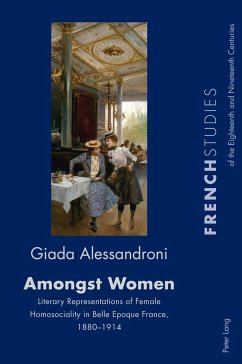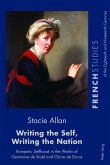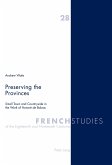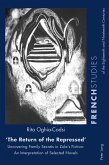«In the wake of pioneering scholarship by Sharon Marcus and Juliette Rogers, Giada Alessandroni's study situates Belle Époque women's writing in the broader literary and cultural history of friendship, highlighting how representations of female homosociality were used 'to deconstruct gender and redefine modern femininity' (p. 24). One of the work's key strengths lies in its careful navigation of the relationship between subversion and the re-inscription of gender norms in a range of middlebrow works by successful women writers. [...] Of particular interest to scholars of women's writing and the Belle Époque, Alessandroni's analysis nuances our understanding of female homosociality, reminding us that literature need not be avant-garde to reflect socio-cultural change.» (Helen Craske, French Studies 76.3, July 2022)
Second fiddle to love, fleeting and inauthentic, a disguise for sexual rivalry, a practice to be policed or, at most, a social mechanism aptly reinforcing traditional gender norms, female friendship did not always have a good reputation in canonical and didactic literature from nineteenth-century France. But how did French women imagine and represent their relationships in fiction, and to what ends?
Situated at the intersection of feminist cultural history and Belle Epoque literary studies, this book explores fictional representations of female homosociality in novels by Daniel Lesueur, Gabrielle Réval, Marcelle Tynaire, and Yver Prost, among others, including women's writing of the Belle Epoque within the narratives of the literary and cultural history of friendship in the long nineteenth century.
Playing with the tension between traditional and modern womanhood and intersecting with topics as diverse as the female body, work, education, marriage, heterosexual love, and the moral regeneration of the French nation, the representation of female homosociality constitutes, in these texts, one of the literary devices throughwhich the figure of the femme moderne comes into being on paper and reflects the authors' engagement with a form of female modernism that problematizes the dichotomy between «high» and «popular» literature, helping to give shape to women's experience of modernity.
This book was the joint winner of the 2019 Peter Lang Young Scholars Competition in Nineteenth-Century French Studies.
Second fiddle to love, fleeting and inauthentic, a disguise for sexual rivalry, a practice to be policed or, at most, a social mechanism aptly reinforcing traditional gender norms, female friendship did not always have a good reputation in canonical and didactic literature from nineteenth-century France. But how did French women imagine and represent their relationships in fiction, and to what ends?
Situated at the intersection of feminist cultural history and Belle Epoque literary studies, this book explores fictional representations of female homosociality in novels by Daniel Lesueur, Gabrielle Réval, Marcelle Tynaire, and Yver Prost, among others, including women's writing of the Belle Epoque within the narratives of the literary and cultural history of friendship in the long nineteenth century.
Playing with the tension between traditional and modern womanhood and intersecting with topics as diverse as the female body, work, education, marriage, heterosexual love, and the moral regeneration of the French nation, the representation of female homosociality constitutes, in these texts, one of the literary devices throughwhich the figure of the femme moderne comes into being on paper and reflects the authors' engagement with a form of female modernism that problematizes the dichotomy between «high» and «popular» literature, helping to give shape to women's experience of modernity.
This book was the joint winner of the 2019 Peter Lang Young Scholars Competition in Nineteenth-Century French Studies.








